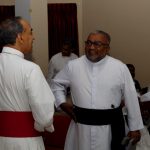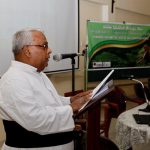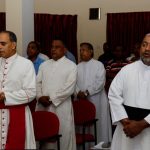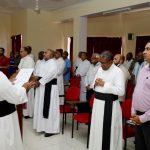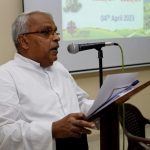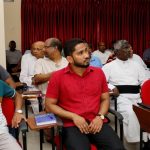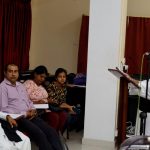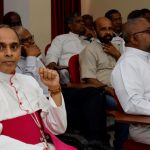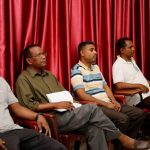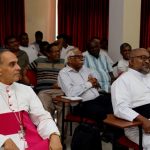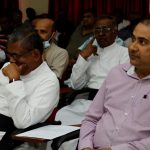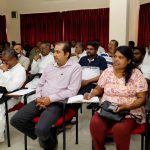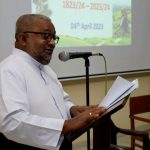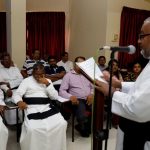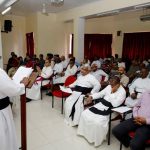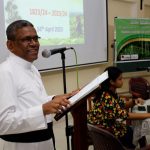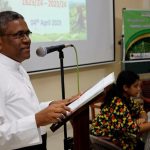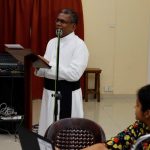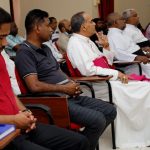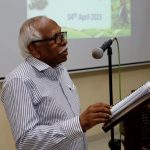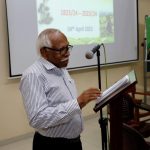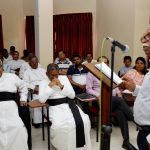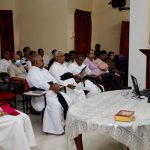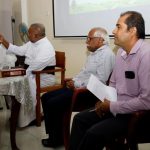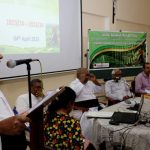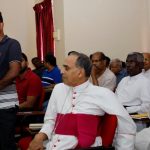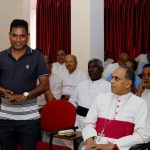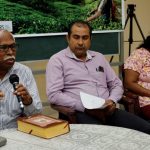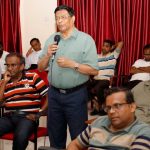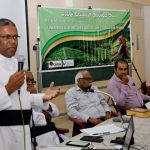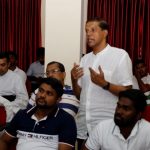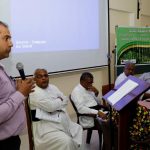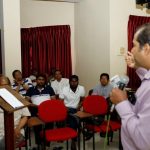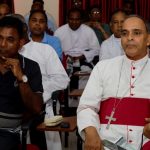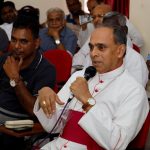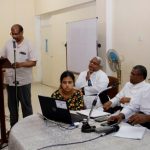An awareness session for clergy of the Diocese of Kandy was conducted on 4th of April 2023 at the Fatima Retreat House Lewella, Kandy with the aim of highlighting the social issues of the Plantation community and the mission of the church leaders in addressing the causes of structural discrimination that the plantation community (Malaiyaga Tamils) have faced over the last 200 years in Sri Lanka.
His Lordship Rt. Rev. Dr. Valence Mendis – the Bishop of Kandy Diocese, Rev. Fr. Luke Nelson – National Director, Caritas Sri Lanka, SEDEC, Rev. Fr. Desmond Perera – Director of SETIK, Rev. Fr. Michael Rajendram – National Animator, for the LLPP program, Mr. Sajith Silva – Unit Head of the Ecological Conservation and Plantation Peoples Unit, Ms. Niranjani Roland and Ms. Vaishnave Lavaneswaran- CSL staff and Mr. Muthulingam Periyasamy – Executive Director for the Institute of Social Development and over 60 priests including the priests from the Plantation community in the Diocese of Kandy participated at the event.
Rev. Fr. Desmond Perera moderated the program and explained the objectives of the program.
Rev. Fr. Luke Nelson, National Director, Caritas Sri Lanka, SEDEC explained on the services and the current interventions of Caritas Sri Lanka, SEDEC in addressing the social issues of the marginalized communities in Sri Lanka.
“We have understood the plight of the plantation community who live in 6 Dioceses in Sri Lanka such as Kandy, Badulla, Ratnapura, Galle, Colombo and Kurunegala and have launched the program called LLPP to do more advocacy and lobbying to light the lives of the plantation people. The program aims to address the 200 years of the hardship of the plantation people and I know that Rev. Fr. Desmond play an important role to address the issues of the plantation people in the Kandy Diocese. I am grateful to the Catholic Relief Service (CRS) for the support of this meaningful program. We are seeking your valuable comments, suggestion and opinion to implement our program more effectively,” said Rev. Fr. Nelson.
Rev. Fr. Rajendram said that “Many people have a doubt as to who are these Malayaga Tamils. This identity comes from the geographical areas that they live and we like to proceed with that identity. They face many social issues as they have not been included in the national stream of education, health, livelihood, land and housing. Therefore, they are unable to enjoy the rights like other citizens of the country. He further stated that even though the plantation people have contributed immensely for the national economy still their contribution is not fully recognized and unfortunately they are being discriminated of their basic human rights.
Mr. Muthulingam Periyasamy, Executive Director of Institute of Sustainable Development (ISD) explained on how the church could move forward in addressing the rights of this oppressed community.
“One of the founders of Liberation theology, had once said that the duty of a Christian is to aid the poor and oppressed through the involvement in the civic and political affairs. In the past history many clergies in the Latin American countries worked for the oppressed people” said Mr. Periyasamy.
He further explained how he began his organization named ISD to work for his own community.
“I can remember once I have spoken to Fathers like Fr. Nandana Manathunga, Fr. Firth on my interest to advocate for my own plantation community and the policy makers on the issues faced by my community. With the recommendation of Fr. Firth, I wrote a proposal and got funds, that is how I started my organization and served my society for the last 32 years. I have never given tangible things to them, just advocacy and lobbying on the plight of the plantation community to the policy makers to bring the changes in their living conditions”.
“During that period many of the Catholic and Christian Fathers were involved in the development programs. I spoke with Fr. Paul Casperz on advocacy and lobbying and he said we can’t come forward but we will support your advocacy and lobbying work and he also said a day should come where the church should focus on the breach of human rights of the plantation community otherwise we can’t bring sustainable changes,” said Mr. Periyasawmy.
Mr. Periyaswamy in his speech highlighted further on followings;
“The church should involve in the protection of the rights and involve in advocacy. At present 169,000 line rooms and 30,000 small sheds are existing in the plantation sector where these oppressed people lived for 200 years. Each generation to generation, they live in a 10 x 12-line house. In 169,000 line rooms, 250,000 families are living at present until today, as they cannot extend the house.
There are many universities in the Country. In the last two years, 1500 plantation students entered the Universities in the Arts Faculty. There are so many doctors and teaching hospitals in the country but in the plantation sector, we still have Estate Medical Practioners. In 1972, the Land reform act was introduced with several changes that occurred in the country but still the plantation community is a landless community. Several times, we lobby with the government but still we could not get a sustainable solution for that. From 1998, we are lobbying for the inclusion of the plantation community to the main stream.
With the participation of the civil society members, we have already prepared and presented an action plan to the policy makers on these rights based issues. Therefore, as a church based organization you all should continuously advocate and lobby with policy makers to bring sustainable development to this marginalized and oppressed community,” he further said.
Later, the forum was opened for questions and answers.
Rev. Fr. Satkunaraja, from the Loolkandura Estate in the Kandy district, where the first tree was planted by James Taylor in 1986, explained the present condition of the plantation people in his parish.
“The estate was closed down and it’s now like a jungle. The people are unemployed, line houses remain as it is with poor sanitation facilities. However, the people were not allowed to build a toilet, no proper water supply. Children in the area of Lookandura had their sport meet in the roads; still they live like slaves. This is the plight of many tea plantation communities” said Fr. Satkunaraja.
Mr. Muthulingam replied for these issues and said once a circular was issued with regards to the plantation schools and emphasized that every school should have 2 acres of land. The Estate should give permission but the only requirement was that the principal has to write and request the estate management on this regard.
Fr. N. Abraham shared his opinion that due recognition should be given to the plantation people who have served for this society. He further said that“ Being a priest for 36 years, I have not done much to my own community. As a community we should fight for our own issues. It is not only Kandy Diocese but the Bishops Conference should raise these issues and put pressure together then only we can get tangible answers otherwise it will be an individual fight”


